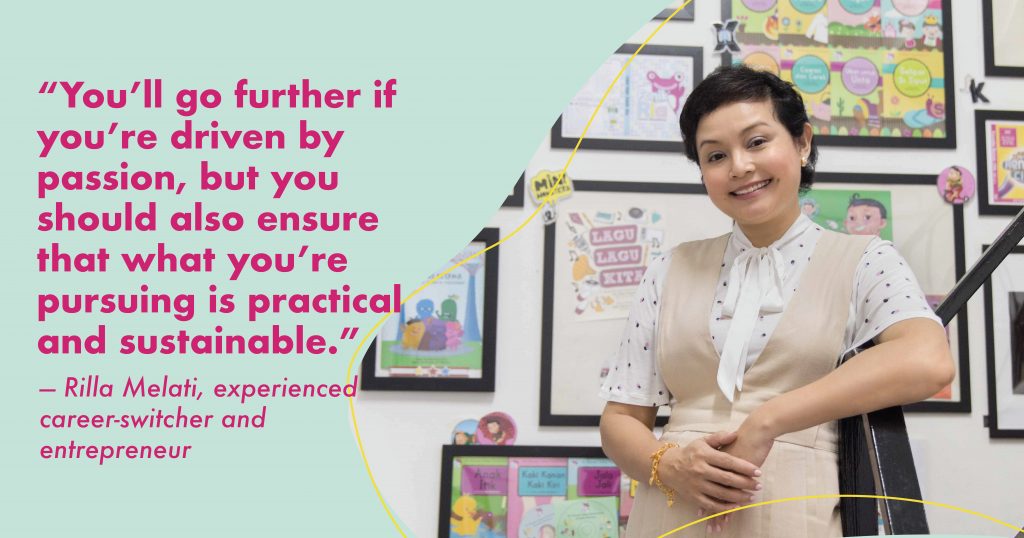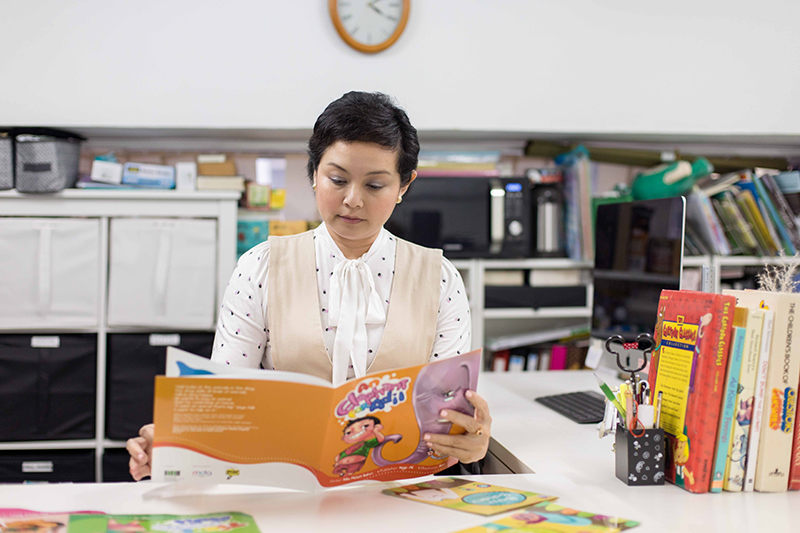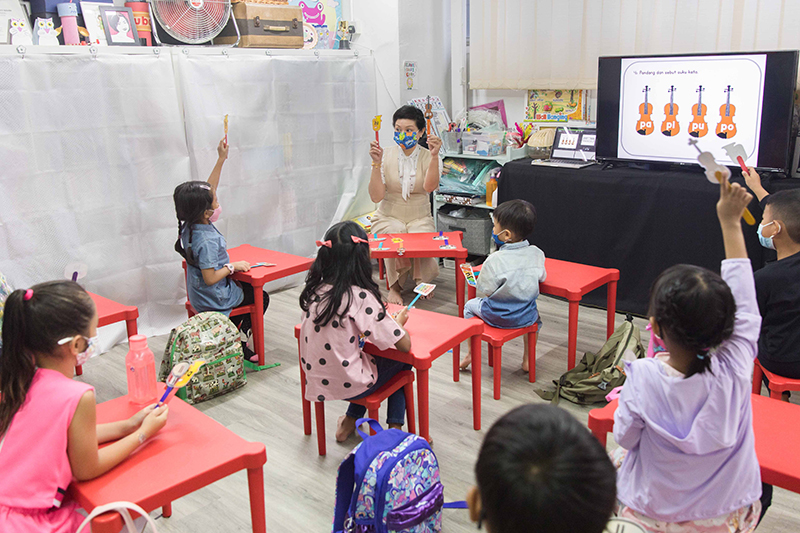7 Nov 2022
SOURCE: CPF Board

If the name Rilla Melati sounds familiar, it’s because I was a cast member of a local children’s TV show called Aksi Mat Yoyo. But did you know that I made a career switch not once, but twice?
I’d been working in the entertainment industry since I was a child, so the studio was like a second home to me.
But like an excitable young adult ready to spread her wings, I decided to step back from the lights, camera and action in my mid-20s to pursue a career in the public sector as an education executive, first at a polytechnic, and later on, at a museum.
Those were stark transitions—from acting in front of the camera, to corporate work that required me to pick up new skills, and navigate dynamic relationships in an entirely new environment.
Everything was mostly unfamiliar. There was a common thread, however — my interest in education and nurturing students.
And I did not stop there.
Four years after being in the corporate sector, I decided to start my own company to explore creating educational content for children. Things didn’t work out so well with my first company and the partnership, and I left. It took me two more years to find my footing, and I finally co-founded Mini Monsters in 2009.
We offer Malay-English enrichment courses and classes, publish bilingual children books, and create content for television programmes and educational resources.
Just look at how things seem to have come full circle. It’s been two decades since I took the leap, but I have no regrets. So, to anyone who’s considering a career switch, go for it, although there really is more to it than meets the eye.
Here’s a behind-the-scenes look at changing careers to pursue your passion.

Facing the reality of a mid-career switch
If only making a career switch was as simple as finding a new position, and then quitting your current job. The reality is that there is a lot of planning involved. For example, those like me, who are part of the sandwich generation, we have to consider who our dependents are, and what impact a career switch would have on everyone.
Personally, my own parents were financially independent. However, my father was the sole breadwinner, and if anything happened to him, I wanted to be able to take care of both my parents.
In joining the public sector, I was still assured of an adequate and regular income, but when I started my own business years later, however, there were additional considerations — I had also just given birth to my son.
This prompted me to start small to minimise liability — with just $4,000 of my savings. I didn’t want to borrow money from the bank to start something that was big and too risky, considering I had a family to support.
Though as much as I made calculated moves, sometimes, life hits you hard, and unexpectedly.
Around the same time, I was in the midst of getting a divorce.
Is your passion enough?
I grew up in the ’70’s when the Malay language was very much alive — we spoke it at home, and it was on the radio, on television, in my books. But in 1992, I was a Theatre Studies undergrad giving speech and drama lessons to children as a freelancer, I realised that while we were teaching children to speak better English, their use of Mother Tongue was waning.
I felt that there was a heavy dependency on imported reading materials, and there was a general lack of creative local Malay content that was context- and age-appropriate. That was one of the key reasons why I started Mini Monsters — to instil a love for the language again. I’m motivated by the changes I’m making in education and the community — not by how much money we’re making.
Money should not be the only end goal. I don’t think it’s sustainable to make a career switch or start your own business because you only want to make more money. You’ll go further and stay the course for longer if you’re driven by passion.
But it’s important to still be financially sustainable in the long run. Mini Monsters has been kept purposefully small, and it’s not that we haven’t grown. What started out as a two-person, two-table set-up under a bigger company now has a junior academy, a digital portal, and a publishing arm, and in 2013 we went fully independent.
My goal was to have just enough, so I’ve kept everything at a manageable size. But the business is my livelihood, so it still needs to provide me a roof over my head. My approach has always been to make an impact on the community, but it should not be detrimental to my personal finance.
If, by doing this, I can’t feed myself, then forget it!
Taking care of loved ones means taking care of yourself first
You may make multiple career changes along the way. As we get older, priorities and preferences change. Some enjoy keeping up with the hustle and bustle of their lives, while others may want to take a step back when the time comes.
For myself, like most Singaporeans, I would like to retire at the age of 65 and still be able to provide for myself and loved ones.
Retirement to me will be when I’m financially comfortable, when I can feel fulfilled with what I’ve accomplished. What I’ve built will continue to ‘feed’ me. I probably won’t be so active in Mini Monsters, which would free up more time for me to do other things like consultancy work.
And I have already set plans in motion for this.
One way I have planned for this is keeping up with topping up my CPF savings over the past 24 years.
Even in the early years of my first business as a self-employed person, I continued making regular contributions to my MediSave Account and that was helpful in covering my healthcare needs as it also compounded with the interest rate of 4% per annum.
MediShield Life was a good foundation, but I also purchased other insurance plans to make sure that all bases were covered. At the point of starting my own business, and caring for my son, I was more focused on the present and didn’t have time to worry about the future, but at the very least, I wanted to make sure that I could keep any potential healthcare expenses covered so that I wouldn’t weigh down my family if anything happened to me.
Now that I’m older and closer to retirement, I’m thankful that I made those top-ups as they have compounded significantly over the years. I’d encourage anyone else who’s going through a switch to keep up with the same. These CPF savings grow with attractive, risk-free interest of up to 5%* per annum, and are safety nets to rely on if you need to. For example, as a fallback for your housing loan if need be, even in your retirement years.
As I take care of my own needs, I’d be better prepared to be there for my loved ones too.
Knowing what is enough, and plan ahead
You should also consider a situation where a career switch wasn’t all that you thought it would be, or when a job change didn’t work out as planned. Having options is always a good thing.
The worst thing that can happen is to leave a job without having a backup plan, and what botches a plan further is self-entitlement, thinking you can go anywhere, and be wanted anytime. You can’t have a mindset of “see what comes my way, lah“. What if unforeseen things like Covid-19 happen?
I’d recommend diversifying your network and skills or taking up side jobs to supplement your income. Back when I was heavily pregnant and couldn’t appear on TV, I had friends in the entertainment industry who knew that I could write, so they farmed out jobs to me.
I ended up writing for anything and everything: fiction, scripts, dramas, documentaries, infotainment, entertainment, and syllabuses for school programs. All this provided me with income which was crucial in the early years of my entrepreneurship journey. It ensured that my savings didn’t completely dry up during the transition period.
They also provided me valuable experience for what I’m doing at Mini Monsters today.

If possible, you should also plan ahead for this transition — I’d say three to five years is a good runway to make preparations like taking up courses and saving more. It’s also good to adopt the mindset that a career change will come sooner or later, whether by choice or compelled by circumstances.
Think about what you would do if you no longer had your job, especially if you’re older. Could you rely on other passive sources of income, or hone a skill that allows you to work remotely?
It may not be easy at the start, but once you begin to settle into the new pace after the transition period, it’s time to plan for the next milestone, because you never know if you’ll be doing this forever.
As I approach the age of 55, I’m making an effort to put aside more savings in my CPF each month to ensure a comfortable retirement based on what I want to do. Here’s where all the CPF monies I’ve saved up over the years will help, too, since I know I can start my CPF LIFE monthly payouts from age 65.
Now, I don’t have to do anything else very different apart from making sure that Mini Monsters is alright. You surely can do more if you are savvy with finances and investments, but this is just me — the same Rilla that knows what enough is for me.
And enough is the “mini” approach that I have taken in life, too. I have a small business, a small car, one child, a HDB flat.
While everything is mini, I actually have everything I wanted: a simple, yet comfortable life; and an impactful, fulfilling career.
That, to me, is enough.
*To enhance the retirement savings of CPF members, the Government pays extra interest on the first $60,000 of your combined balances. Terms and conditions apply. Read about CPF interest rates here.
Rilla Melati is a pioneer of Malay speech and drama programmes for schools in Singapore, and the founder of Mini Monsters Ltd. She is also the author of several Malay and bilingual children’s storybooks and has written scripts for many Malay children’s TV shows since the 1990s.
Information in this article is accurate as at the date of publication.


